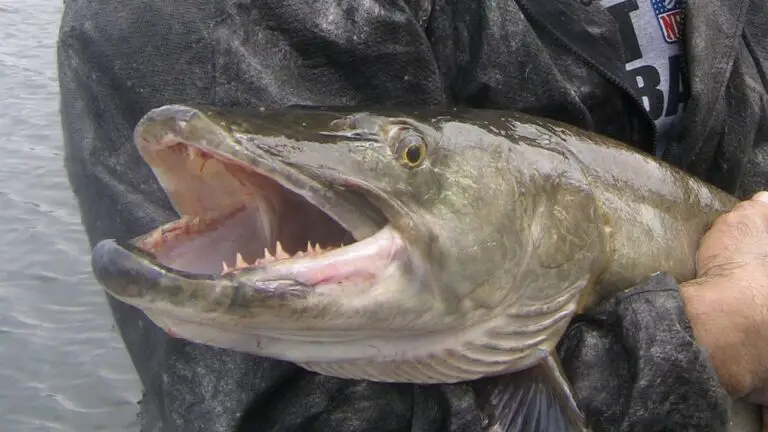Are Muskie Aggressive? The Myths and True Dangers
You may hear some news talking about muskie attacks, or listen to a fellow angler picturing their fight with one on the boat. You may think to yourself “are muskies that dangerous?” After all, it’s just a fish! I’ve asked myself the same question and got the right answer.
Are muskie aggressive? Yes, muskie are aggressive. Muskies have a predatory nature that makes them good at fighting to be able to hunt most of their time. Their powerful bodies are built for speed and their strong muscles allow them to fiercely attack their prey and fight their way out of a lure as well.
Whether you’re familiar with how aggressive muskies are or just trying to figure the limit of danger and know the truth behind muskies myths, I got you. Keep reading to know more about it.
Table of Contents
Are Muskie Aggressive?

It’s true, muskies are one of the most aggressive fish out there. Some people call it “The barracuda of freshwater” because they fight hard and things can get pretty intense in no time. Muskies are natural predators, they’re born to hunt most of their time.
They fight underwater to earn their meal, and out of the net when they’re caught. That’s why Musky fishing offers a thrill that compares to no other type of fishing that anglers sooner or later get addicted to.
Muskies are big fish that can grow as long as 6 feet (1.8 meters) long, while possibly weighing more than 50 pounds (about 22.5 KG) with strong muscles that allow them to be fast and vicious. Muskies also get easily stressed when taken out of water for longer than they should which can result in more aggressive behavior.
Do Muskies Attack Humans?
So, do muskies attack humans? Yes, muskies attack humans even though it happens very rarely and it’s not based on feeding purposes. Muskies may bite humans with their set of sharp teeth because they mistook them for something they could eat. You can avoid the bite if you follow some simple precautions.
Before you freak out or believe myths associated with the “freshwater monster” you need to know everything about the causes and effects of these attacks and how you can avoid going home with a bleeding hand or foot.
Muskies attack everything they assume they can feed on. If you kept wiggling your hand or feet in the water, they’ll think it’s something that they can attack and eat. However, it’s reassuring to know that muskies won’t attack something bigger than ⅓ of their body length, so they won’t attack you while swimming.
Human flesh isn’t on the menu of things muskies enjoy, so when they attack a human it’s not because they’re trying to bite their flesh off, it’s simply because they’re yielding to their predatory nature. They attack, puncture, and grab their prey before they consider what the prey is.
Do Muskies Have Teeth?
So, do muskies have teeth? Yes, muskies have teeth. They have both bigger canines razor-sharp and smaller needle-like teeth. A muskie can have between 500-to-700 teeth in its big mouth. Their teeth can grow up to 1 inch (2.5 cm) in length.
Muskies use their sharp teeth to grab, puncture and kill their prey. The bigger teeth are tightly positioned along its lower jawline and work as the main hunting tool that they use to grab their prey. While the smaller rows of teeth are angled inward to do the job of getting a good grip of prey and prevent it from escaping.

Did a Muskie Attack a Girl on Island Lake?
Yes, it has been reported that a muskie attacked a girl on island lake, twice! Two different girls reported a muskie attack on Island Lake less than two months apart. Find the news report below:
The earlier attack happened on July 19, 2017, to Maren Kesselhon, an 11-year-old girl who was hanging out on her family’s paddleboard. She suddenly felt something grabbing her feet that she was dangling in the water, turns out a muskie got her feet in its mouth and didn’t let go until she kicked it with her other foot. Maren needed stitches on her ankle and upper feet afterward.
The second attack happened on September 4, 2017, less than two months after Maren’s incident. Twenty-two-year-old Paige Dougherty’s foot was bitten by a muskie around the same place of the previous attack, with another thing in common; she was dangling her feet in the water as well.
What’s different about the second attack is that people were able to trace the pattern, and the common thing was the shiny anklet the girls wore while dangling their feet in the water. Muskies are visual predators that go after shiny lures especially at night, so when it attacked the girls’ feet, it was because it mistook it for lures they could catch.
9 Tips to Avoid Getting Bitten by a Muskie
Whether you’re an angler that has muskie on your bucket list or you’re just a person planning to go for a dip in the lake without worrying about getting bitten, here are some precautions to consider:
- Don’t leave your hands or feet dangling near the water surface, especially when you have nail polish on. Colors entice muskie to strike mistaking it for lures.
- Avoid wearing shiny accessories. Muskies can be triggered to strike by any flashy jewelry paired with rapid movement.
- Don’t get too close to their mouth after being caught.
- Keep your boat stable. The aggressiveness of muskies on an unstable boat can maximize potential risks.
- Always be ready with a good quality musky net to ensure a safe and secure hold of the muskie. It helps you keep the muskie underwater during measurement to decrease their aggressive behavior resulting from stressing out. Click here to choose from wide varieties on Amazon.
- Be ready with rubber gloves to hold a muskie after you catch it. It protects your hand from their sharp teeth.
- Use release tools like long-nosed pliers to help to remove the hook safely without exposing your fingers to their teeth
- Hold a muskie horizontally not vertically after you catch them. Holding them vertically can damage their gills and maximize their stress, hence, more aggressive actions.
- Hold a muskie with both hands horizontally to safely release your muskie back into the water without getting your hand near their mouth.
Now you’re all set with the things that help you avoid getting bitten by a muskie. For the best chances of success on your next adventure, I highly recommend checking out my recommended muskie reels here.
Share and pin this article on Pinterest for future reference!
Related Questions
Are Muskie Dangerous?
Yes, muskie are dangerous to a certain extent. They are predatory fish that have high levels of aggressiveness that can make them quite dangerous. Despite it happening rarely, muskies can attack humans and bite on their hands or feet causing cuts and scrapes on their skin.
Are Tiger Muskies More Aggressive?
Yes, tiger muskies tend to be more aggressive but it’s not a very noticeable difference. Some anglers say that tiger muskies even fight with each other in one tank if they find nothing they can fight. But you can’t say that regular muskie won’t do the same.
You can learn how to handle a tiger muskie properly here in order to avoid getting bit.
Are Muskie or Pike More Aggressive?
Muskie and Pike are both extremely aggressive game fish that share the same behavior. They hunt in the same vicious way and put up a great battle, anglers say that muskies are a little more unpredictable when it comes to aggressiveness, but pike is definitely on the same level.
Muskie and Pike do look a lot alike which is why a lot of anglers that are not quite familiar with both get these two mixed up. You can learn all the other differences between Muskie and Pike here.








